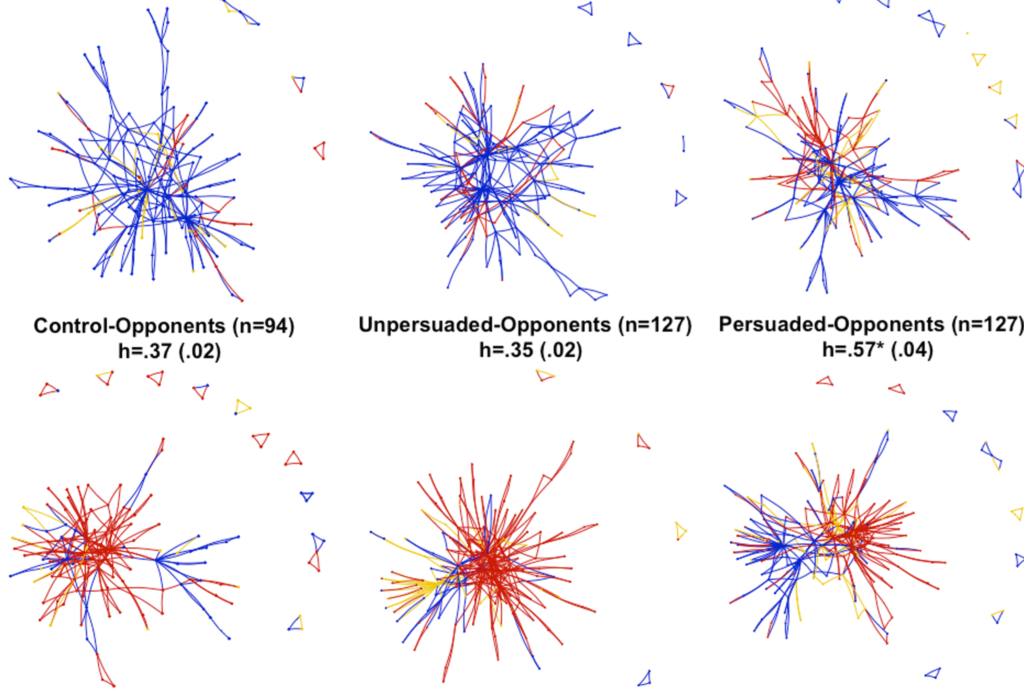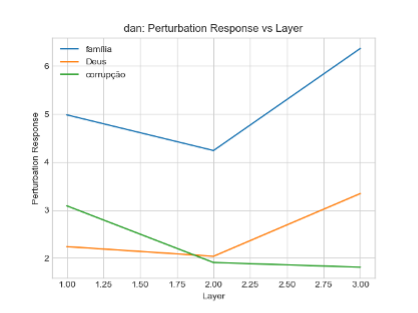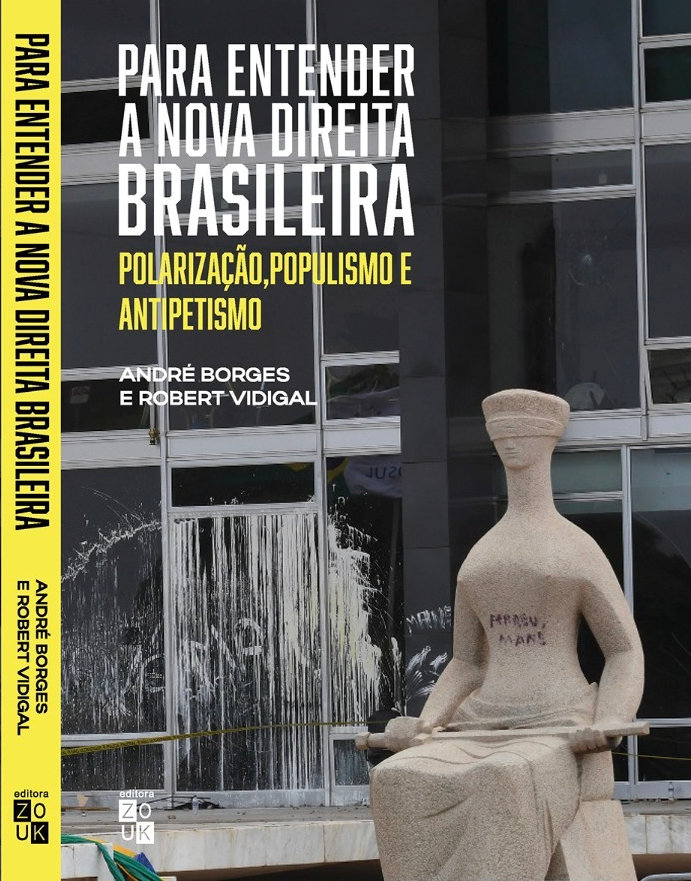AMERICAN POLITICAL BEHAVIOR
UNDERSTANDING LATINO POLITICAL ENGAGEMENT ON SOCIAL MEDIA
(with Marisa Abrajano, Marianna Garcia & CSMaP colleagues). Political Research Quarterly. 2025.
HOW RELIANCE ON SPANISH-LANGUAGE SOCIAL MEDIA PREDICTS BELIEFS IN FALSE POLITICAL NARRATIVES AMONGST LATINOS (with Marisa Abrajano, Marianna Garcia, & CSMaP colleagues). PNAS-NEXUS. 2024.
ISSUE FRAMING EFFECTS ACROSS INFORMATION ENVIRONMENTS
(with Wladimir Gramacho & Max Stabile). Political Behavior. 2025.
MEASURING BELIEF CERTAINTY IN POLITICAL KNOWLEDGE
Political Behavior. 2025.
ON THE INDEPENDENT ROLES OF COGNITIVE & POLITICAL SOPHISTICATION: VARIATION ACROSS ATTITUDINAL OBJECTS
(with Joe Vitriol, Joe Sandor & Christina Farhart). Applied Cognitive Psychology. 2022.
ISSUE IMPORTANCE AND THE CORRECTION OF MISINFORMATION
(with Jenn Jerit). Political Communication. 2022.
WHEN, HOW, AND WHY PERSUASION FAILS: A MOTIVATED REASONING ACCOUNT
In: The Oxford Handbook of Electoral Persuasion.
(with Ryan Cotter & Milton Lodge). Oxford University Press. 2020.
THE BOUNDARY CONDITIONS OF MOTIVATED REASONING
In: The Oxford Handbook of Electoral Persuasion
(with Ryan Cotter & Milton Lodge). Oxford University Press. 2020.
LATIN AMERICAN PUBLIC OPINION
PROGRESSIVE POLICY CHANGE, CULTURAL BACKLASH, AND PARTY POLARIZATION IN LATIN AMERICA
In: The Recasting of the Latin American Right.
(with André Borges). Cambridge University Press. 2024.
LESSER-OF-TWO-EVILS? PARTISAN IDENTITY & AMBIVALENCE IN BRAZIL
(with Álvaro Pereira). Opinião Pública. 2024.
AUTHORITARIANISM AND RIGHT-WING VOTING IN BRAZIL
Latin America Research and Review. 2022.
“From Lulismo to Anti-petismo?” POLARIZATION, PARTISANSHIP, AND VOTING IN BRAZILIAN PRESIDENTIAL ELECTIONS
(with André Borges). Opinião Pública. 2018.
AFFIRMATIVE ACTION ATTITUDES OF WHITES: EVIDENCES FROM A LIST-EXPERIMENT SURVEY IN BRAZIL
Brazilian Political Science Review. 2018.
EDITED VOLUMES
Despite the growing interest in the study of social movements, political parties, activists, and right-wing voters, there has been a noticeable absence of work capable of integrating various approaches and offering a conceptual and empirical synthesis on the emerging of the new ultra-conservative and populist forces in Brazil. Indeed, the lack of dialogue among research conducted from diverse perspectives—such as those of right-wing movement activists or voters—has hindered the attainment of a more comprehensive understanding of the various processes and dynamics associated with the reorganization of Brazilian society. This book aims to address these deficienciespresenting a diverse array of research that examines different aspects of the reconfiguration of the Brazilian right. The chapters encompass a wide range of topics, from the activities of right-wing movements both offline and online to the behaviors of voters aligning with the new right-wing factions.
SELECTED WORKING PAPERS
Affective Homophily: A Motivated Reasoning Account for Why Persuasion Fails. Under review.

Theories of attitude change show that strong persuasive messages often times fail to persuade citizens. We develop a dual process network model based on the theory of political motivated reasoning to account for why persuasion so often fails. Here, political evaluation is driventhe hot cognition postulate which posits that all social-psychological concepts are affectively tagged. By this account it is not cognitive content, but affective homophily – the preferential of political associations – that drives the evaluation of a persuasive message. We collect affective tallies through a thought-listing task after a framing experiment to test how pre-existing positive or negative associations affects the evaluation of a persuasive message on the issue of genetically modified foods. From the resulting network of mental considerations, we test the following reasoning processes: Hot Cognition → Network Homophily → Motivated Reasoning. First, we show that the content and structure of core associations is best characterizedaffectively congruent associations. Second, we test how framing changes not only the cognitive content of survey responses but also the connectivity among core associations. Finally, we employ an ERGM model to show that affective homophily gives the motivation to defend pre-existing beliefs against counter-attitudinal political information.
Yay or Nay? Brazilian Impeachment’s vote prediction from Political Speech. Under review.

Language is the channel for politics and an integral part of political conflict. Politicians constantly battle to secure the linguistic high ground, to control the language of a debate, and hence to frame the manner in which issues are considered. In 2016, Dilma Rousseff, the 36th president of Brazil, was charged with criminal administrative misconduct and disregard for the federal budget in violation of the Constitution of Brazil and the Fiscal Responsibility Law. Here, I take the collection of vote speeches (504 valid votes out of 513 members of congress) during the Impeachment session in 2016 to predict ‘yay’ and ‘nay’ votes, and civil or uncivil rhetoric. Through a split-sample design, I employ a deep averaging neural network (DAN) architecture inputted with word embeddings. The classifier maps the speeches into our measure of interest: the impeachment vote. While the model is syntactically ignorant, I show significant improvements over previous bag-of-words modelsdeepening the neural network and applying a novel variant of dropout leading to achieve a 90% accuracy in the speech’s classification. The high-level of accuracy achieved here shows that MCs were using clear-cut different language during the 2016 impeachment session.

